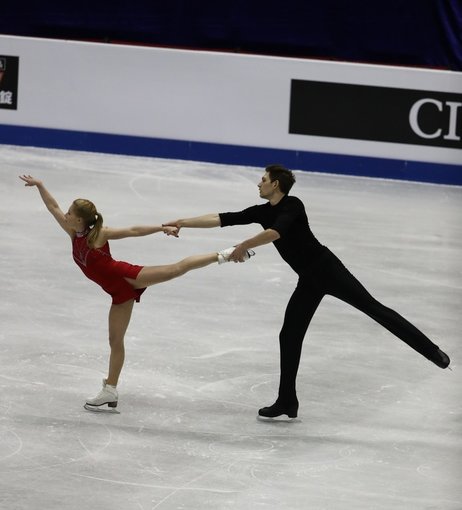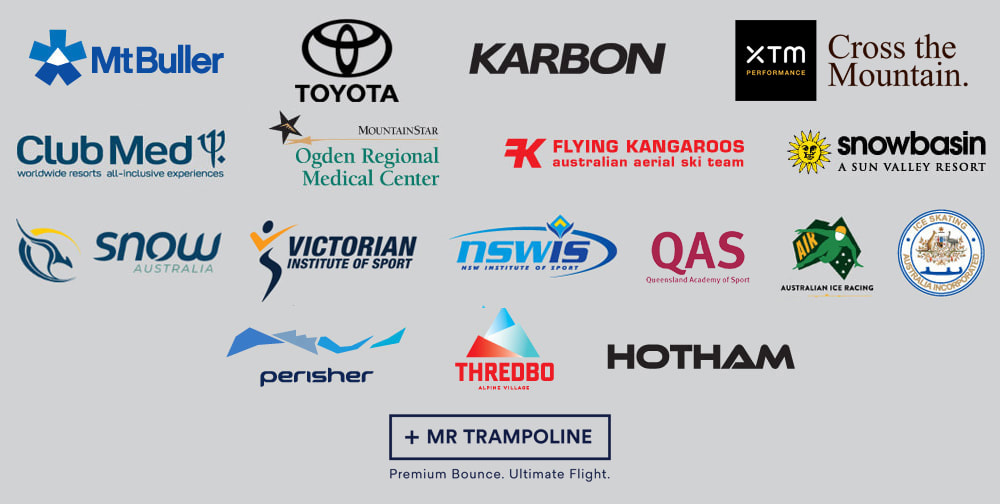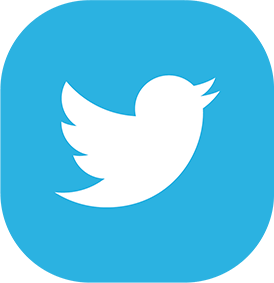 Pair skaters Ekaterina Alexandrovskaya and Harley Windsor on their way to winning the Junior World title in March. Photo: Ludwig Welnicki
Pair skaters Ekaterina Alexandrovskaya and Harley Windsor on their way to winning the Junior World title in March. Photo: Ludwig Welnicki 30 May 2017 - Lausanne, Switzerland
Pair skaters Ekaterina Alexandrovskaya and Harley Windsor took the skating scene by storm. Not only did they win the 2017 World Junior title after having skated together for a little over a year, but they also are the first Australian figure skaters to win an ISU Championship title.
Q: How did you start skating?
E: My mom took me after she had a dream one night. Near our house in Moscow, an ice rink opened and my mom took me there. I skated right away and my mom said, you can train. I was about four and a half years old when I started. I remember my first competition, I took second place, because I fell on a three-turn. I would have been first if I hadn’t fallen on that little three-turn.
H: I became a skater literally by accident. I was with my mom, on a Saturday morning, it was in the middle of summer and we just took a wrong turn and I found an ice rink. There was nothing else to do on a Saturday so I just went into a public session. I quite liked it so I asked to go back the next week and the next week, the next week… I was eight when I first started. First (I went) once a week, then twice a week, three times a week. Then one of the coaches at the rink saw me and suggested private lessons. So I had private lessons for a few months and then after a while I moved to Galina and Andrei (Pachin, coaches) and I’ve been with them for eight years now. Sort of the last two years I didn’t really do anything and I was about to quit.
Q: What made you change your mind and start Pair Skating?
H: Andrei was in Moscow at the time. He called and had spoken to Nina (Mozer) who said there are three girls that I could try Pair Skating with. He asked, if I wanted to come over and try it out. I was like ‘ok’ and a week later I was in Moscow.
Q: Why did you want to give it a try?
H: I really enjoyed watching pairs and sort of the excitement of it. So I was like, if I don’t like it, I guess it is a kind of holiday for me. So I went to Moscow and I wasn’t training for like three months before that. I was super unfit. That was mid of December (in 2015). When I went there I was on the ice and Nina Mozer came out to watch. She just wanted one double Axel, one triple toe, one triple Sal and one flying camel and she just said ‘thank you’ and left. I didn’t understand what that meant. I had no idea and I asked Andrei. He was like ‘I have no idea’. So we just left. I was staying at his mom’s apartment and he called me and said that Nina had called and said, “be at the rink tomorrow at 11.00”. I went to the rink the next day. We started with lifts off ice and it was terrible. I remember I almost dropped her on her head the first time I lifted her. She (Ekaterina) was the first girl I tried with. I even didn’t try with other girls. We did a few off ice lifts. I never had done lifts before on the ice. I did very basic lifts before, press lift, star lift, that is basically it. I had somebody else to show me a reverse (lift). I had no idea what I was doing.
Q: Wasn’t that scary for Katia?
H: I don’t know if she knew at the time that I had no pair experience. She sort of just assumed that I had pair experience (laughs).
Q: Katia, when and why did you switch to pairs?
E: I was eleven years old, in December 2011. Pair skating I think is much more interesting. There are many different elements and I thought it would not be boring at practice. There is support, and you have a partner. I didn’t like singles so much, it was only jumps, jumps and the competition was very tough.
It wasn’t yet like it is now, but still, without a triple Lutz or triple-triple combinations you couldn’t go anywhere. I said to myself I want to try it and my mom also said, let’s try it. I went to Andrei Grigorievitch Hekalo, who is one of our coaches today, at the ice rink “Inspiration”, where Nina Mozer is working, so he could look at me.
I skated alone for two months and then they gave me a partner, but the level wasn’t that high obviously. After these two months I went to Ukraine. I saw an advertisement on a site that they were looking for a partner and it was the right age, too. My mom and I lived in Ukraine for half a year, in Dnepropetrovsk.
That was in 2012, from March to September. Then we took the decision to go back to Moscow, because it was not working. We asked Nina Mikhailovna (Mozer) to skate in her school again and they gave us Vladislav Zhovnirski as a coach. We skated for half a year and then we split up. To fight for sixth place at an event of the Russian Cup series …
I already wanted to stop, and suddenly Nina Mikhailovna said, there is someone from Australia. At first I didn’t even understand if it was Australia or Austria, but I didn’t really care at this point. My mom and I thought about it for two days and then we decided it is worth a try. He (Harley Windsor) came to Moscow and we tried out.
We suited each other physically and from our looks. But it was scary to travel to Australia, a different language, you don’t know anyone and it is far away. But the whole training process is much better in Moscow than in Australia, because the ice and the conditions are not the same. It is a hot country and they don’t have so much training time. We have to go out on to the ice at eight in the morning and on Saturday at 6.30 in the morning and it is always very crowded. They have only three or four ice rinks in Sydney. Figure skating is not very well developed there.
Q: You are quite often in Moscow now. How is your Russian?
H: Not very good. I can understand a little bit more, but I’m a little bit scared to talk, because I make so many mistakes. I only speak with my friends in Moscow, because I make mistakes and they still understand. But if I speak it in the street people are like what?
Q: How do you like Moscow and Russia?
H: I hate Moscow (laughs).
E: It’s because he was born in paradise and Moscow is just lots of houses and there is no sea and the weather is not very good.
H: Maybe if I came from somewhere else to Moscow it would be a bit different, but coming from Sydney it’s like… have you ever been to Sydney?
Q: No.
H: Just the quality of everything I guess. I don’t really like Moscow, but I put up with it, because training is worth it. So I just deal with it. It’s also hard being by myself there as well.
Q: Do you have other athletes in your families?
E: My mom was a fencer until she was 15 years old. She did quite well, but during this moody transition age that everyone goes through, she gave it up and her mother at the time didn’t support her enough, didn’t tell her that she should go on. When I said I want to stop, my mom said, ‘are you crazy? You already spent the majority of your life in Figure Skating and you can’t just stop like that’.
Also Andrei Grigorievitch (Hekalo) supported me a lot in these tough times when I said I don’t want to go out on the ice. I had problems with my partner and then the transition age, you are in a good mood and the next moment you want to jump from the balcony. Andrei Grigorievitch gave me a lot of support and told me ‘I’ll find you another partner’. Three months after this conversation I got one and now I’m here.
H: My brothers and sisters did sports, when they were younger, but nothing too major. I’m the youngest. My parents were married before, so I have four brothers and four sisters, they are half (brothers and sisters), but I just call them brothers and sisters. They’re all married and have kids now, a completely different life.
All my brothers and sisters grew up horse riding, because my parents are from the country (side), like way, way up. My mom is nine hours from Sydney and my dad is pretty close to the Queensland border. My parents grew up on a farm. They moved to Sydney maybe 20 years ago. All my siblings were horse riding, but I hated it. So I was completely different from my siblings.
Q: You made history by winning the World Junior title. What were your emotions on the podium at Junior Worlds?
E: It was kind of funny.
H: Lots of smiling.
E: It was like a dream. I felt like someone will pinch me and I will wake up.
H: I knew I won a competition, and it was a good emotion, but it wasn’t a 100 percent clicking that it was Junior Worlds and it still hasn’t really clicked either.
Q: What do you think your historic victory means for you and for Australian Figure Skating?
H: For us it’s really, really good for our first season. I don’t think many pairs have their first season and win their first Junior Worlds. It’s definitely exciting for us and for Australia I guess it helps them a lot with the skating and brings Australia into the skating world a little more. Hopefully we encourage a few more skaters.
Q: How was the reaction in general to your victory at Junior Worlds?
H: Everybody was obviously very excited and happy for us. When we were in Australia we had to go to Melbourne for Olympic Committee activities for TV promotion and stuff like that. All the winter athletes were in Melbourne for the week doing a bunch of stuff down there. We had to do an exhibition as well.
Q: How was your experience at the World Championships like?
H: Going to senior Worlds was definitely a lot different than going to Junior Worlds, just the overall stadium, a lot more people and the atmosphere was really different. I was really nervous when I first arrived, but once I got on the ice it was not too bad.
E: It was tough, yes, because there were so many people at the rink, there were other athletes, other competition. Not only the competition, but there were these great athletes. We were nervous, but when we skated the short program and we realized we just need to skate clean and we have nothing to lose, because the most important thing for us was to make the top 16 (the final), which we did. We beat our personal best, but we didn’t skate our best in the free.
Q: What is your plan for next season?
H: I really would like to be on the senior Grand Prix. It would be really cool if we could get an invite to a senior Grand Prix. I want to have that new experience. And of course, next year at Four Continents we aim at top eight. That would be really good for us.
Q: It was very hard to qualify an Olympic spot and you need to go to the qualifying competition in Oberstdorf (Germany). How are you going to prepare?
H: We’re currently starting our new short program, so that’s in progress right now and we’ll be doing our long program in a month’s time.
Q: What kind of music have you picked?
H: For our short it’s a remix of the Rolling Stones’ “Paint It Black”. It’s very strong music and it’s a little bit dark I guess and needs lots of emotions and strong skating to do it. We’re trying to work around that and see how we can pull it off. We have no idea what our long program is going to be yet. Still listening to a few pieces of music I guess and trying to decide on what everyone likes.
Q: Because of Oberstdorf you have to be ready quite early. How are you going to prepare to fight for that Olympic spot?
H: We just train like the last season. Our preparation in the last season was a lot better towards the end of the year so I think we’ll be more experienced now and know what we need to do to train and to get fit in programs. So I guess we’ll be just doing the same training that we did leading into last year’s season.
Q: You recently took part in the ISU Pair Skating seminar in Novogorsk (Russia). What are your next plans?
E: We’re going to a training camp in Kislovodsk, off ice, then we’ll train in Moscow and maybe we go to Italy. We’ll be mostly in Europe, but he has a problem with his visa, it is expiring, so maybe he or we together will fly for one week to Australia, so he gets the visa. There is no way to get it here (in Russia).
Q: How is your Australian citizenship coming along?
E: There is progress. Soon I’ll probably get the residence permit and then it shouldn’t take too long to get the passport. I don’t know when this will happen, but the process is going on and we’re doing everything for it.
Q: Thank you very much for the interview! And good luck for the next season.
Courtesy: Interviewer Tatjana Flade for ISU



 RSS Feed
RSS Feed






